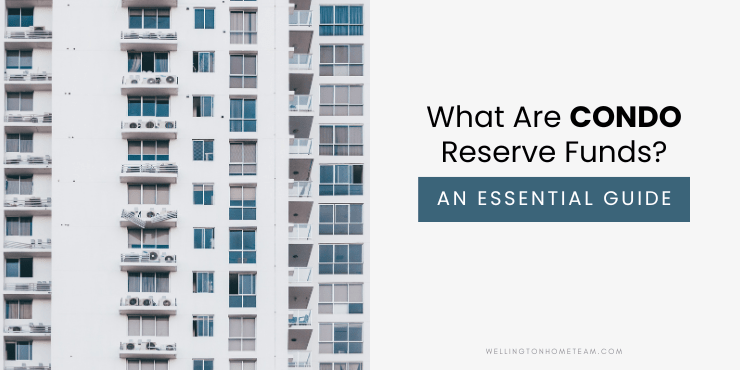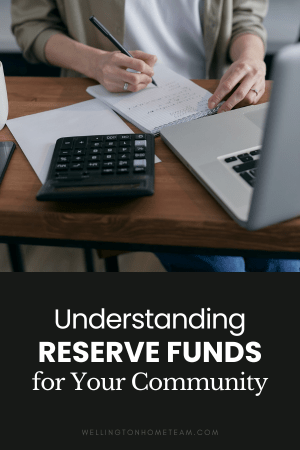

Condo reserve funds are crucial for HOA communities. These funds serve as savings for future repairs and replacements in common areas. Insufficient reserve funding can lead to financial difficulties and the need for special assessments or increased fees. These monies can also be called HOA reserve funds .

Conducting a reserve study by professionals helps evaluate the status of reserve funds. Establishing and maintaining a healthy reserve account is crucial to cover unexpected expenses. Collaboration with HOA board members and effective communication with homeowners is essential for proper reserve fund management. Challenges and legal considerations must also be taken into account.
Following best practices ensures sustainable condo reserve funds for the future of a community. From experience as a Wellington Realtor, checking on the financial health of a community is top of mind for many buyers.
Condo reserve funds play a crucial role in HOA communities by providing financial stability and security for future repair and replacement needs. These funds are separate accounts dedicated to accumulating savings that can be used for major repairs, renovations, or unexpected expenses in common areas and shared amenities.
The Role of Reserve Funds in HOA Communities
Reserve funds act as a safety net to ensure HOA communities can address significant repairs and replacements without burdening homeowners with immediate, hefty special assessments. These funds are primarily designated for large-scale projects, such as roof replacements, elevator repairs, or pool renovations, which extend the lifespan and enhance the property’s value.
The Consequences of Insufficient Reserve Funding
Insufficient reserve funding can severely impact the HOA community and individual homeowners. With adequate reserves, the HOA may be able to address necessary repairs and replacements, leading to potential deterioration of the property’s condition and decreased overall value.
In such cases, homeowners may face sudden assessments, increased monthly HOA or condo fees , or deteriorating community amenities.
A reserve study is a crucial step in effectively managing HOA reserve funds. By conducting a reserve study, HOA boards can comprehensively understand their community’s financial needs and plan for future repairs and replacements. The purpose and benefits of a reserve study and the importance of hiring professionals for an accurate assessment are vital.
Understanding the Purpose and Benefits of a Reserve Study
A reserve study serves as a roadmap for financial planning within an HOA community. It evaluates the current condition of common elements, estimates their useful lifespan, and projects the associated costs of repairs and replacements over time.

By clearly understanding the financial requirements, HOAs can make informed decisions regarding reserve contributions and ensure the long-term financial health of the community.
Some key benefits of conducting a reserve study include:
These are just four benefits of conducting a study for reserves.
Hiring Professionals for an Accurate Reserve Study
While HOA board members may have a good understanding of their community’s needs, it is advisable to seek the expertise of professionals to perform a reserve study. These professionals, such as reserve study specialists or engineers, have the knowledge and experience to conduct a thorough assessment.
When hiring professionals for a reserve study, consider the following:
By engaging professionals, HOA boards can have confidence in the accuracy and reliability of the reserve study findings. This professional assessment is a valuable tool for effective financial planning and decision-making.
Managing and effectively utilizing condo reserve funds is essential for the long-term financial stability of the community. Having and maintaining a healthy reserve account and using the condo reserve funds for necessary repairs and replacements should not be overlooked.
Establishing and Maintaining a Healthy Condo Reserve Account
A healthy reserve account requires careful planning and consistent contributions. Here are some key considerations:
Using Condo Reserve Funds for Repairs and Replacements
The reserve funds are crucial in financing repairs and replacements within the community. Consider the following when utilizing reserve funds:
Determining the Ideal Amount for Reserve Funds
When it comes to HOA reserve funds, determining the ideal amount is crucial for long-term financial stability. While there is no one-size-fits-all answer, several factors should be considered.
Long-Term Planning and Budgeting for Reserves
Proper long-term planning and budgeting are essential to ensure the viability of condo reserve funds. It involves understanding the community’s ongoing and anticipated financial needs and developing a comprehensive strategy.
Some critical considerations for effective long-term planning and budgeting include:
By appropriately determining the ideal reserve fund amount and implementing a well-thought-out long-term planning and budgeting strategy, HOAs can ensure financial security and effectively address the community’s future needs.
Effective collaboration and communication between the HOA board and members are crucial in managing condo reserve funds. By involving board members in reserve fund management, you can leverage their expertise and diverse perspectives to make informed financial decisions. This collaboration ensures transparency and shared responsibility for the reserve funds’ health.
Involving Board Members in Reserve Fund Management
Encouraging board members’ active involvement in reserve fund management fosters a sense of ownership and accountability. Regular meetings should be held to discuss the reserve fund’s financial status, upcoming projects, and potential funding needs.
You can benefit from their collective insights and expertise by including board members in decision-making, enabling better fund allocation and planning.
Educating and Informing Homeowners about Reserve Funds
Open and transparent communication with homeowners is essential to build trust and ensure their understanding of the purpose and importance of reserve funds. Regularly inform homeowners about the current status of the reserve fund, ongoing or upcoming repair projects, and the significance of maintaining adequate funding.
Providing educational materials, organizing informational sessions, and utilizing digital communication channels are effective ways to keep homeowners well-informed.
Moreover, homeowners should be encouraged to actively participate in association (HOA) meetings and discussions related to reserve funds. Their input, ideas, and concerns can contribute to informed decision-making and help prioritize funding for projects that align with their expectations and the community’s needs.
By fostering collaboration and maintaining clear lines of communication, HOA boards and homeowners can work together towards the shared goal of effectively managing and utilizing condo reserve funds for the community’s long-term well-being.
Dealing with Unexpected Expenses and Emergency Repairs
Managing HOA reserve funds can be challenging when unexpected expenses and emergency repairs arise. These situations can put a strain on the reserve account and require careful consideration and planning:

Addressing Special Assessments and Funding Shortfalls
In certain circumstances, addressing special assessments and funding shortfalls becomes necessary to maintain the financial stability of the HOA’s reserve funds:
By proactively addressing unexpected expenses, emergency repairs, and funding shortfalls, HOAs can effectively manage their reserve funds and ensure the long-term financial health of the community.
Understanding Laws and Regulations Related to Reserve Funds
HOA reserve funds are subject to various laws and regulations that govern their establishment, management, and use. HOAs must understand these legal requirements to ensure compliance and protect the interests of homeowners.
Some common legal considerations for HOA reserve funds include:
Compliance and Reporting Requirements for Reserve Funds
HOAs must fulfill specific compliance and reporting requirements concerning reserve funds. These obligations help maintain transparency and accountability in the management of these funds.
Some substantial compliance and reporting considerations for HOA reserve funds include:
Understanding and adhering to the legal and regulatory framework for HOA reserve funds is crucial for maintaining transparency, accountability, and compliance within the association.
Managing HOA reserve funds effectively is crucial for the long-term financial stability of the community. By following best practices and implementing intelligent strategies, HOAs can ensure their reserve funds are sufficient and well-maintained. Here are some tips to consider:
Working with Professional HOA Management Companies
Collaborating with experienced HOA management companies can significantly assist in reserve fund management. These professionals have the expertise and knowledge to guide budgeting, reserve studies, and financial planning. They can help HOAs accurately assess their reserve needs, establish realistic funding goals, and ensure compliance with relevant regulations.
Please consider spreading the word and sharing; What are Condo Reserve Funds? An Essential Guide
Top Wellington Realtor, Michelle Gibson, wrote: “What are Condo Reserve Funds? An Essential Guide ”
Michelle has been specializing in residential real estate since 2001 throughout Wellington Florida and the surrounding area. Whether you’re looking to buy a condo, sell an equestrian estate, or rent a single-family home she will guide you through the entire real estate transaction. If you’re ready to put Michelle’s knowledge and expertise to work for you call or e-mail her today.
Areas of service include Wellington, Lake Worth, Royal Palm Beach, Boynton Beach, West Palm Beach, Loxahatchee, Greenacres, and more.